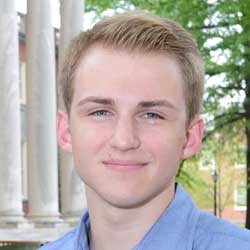Acute Lymphoblastic Leukemia
Eighteen-year-old Matthew Myers is a rising sophomore at Samford University in Birmingham majoring in pre-pharmacy. Why pre-pharmacy? He answers without hesitation. “My intention is to complete my residency in pediatric oncology and work at Children’s downtown,” he said. “To be able to do that would be a life-fulfilling dream.” Myers is quite familiar with Children’s of Alabama. At age 23 months, he was diagnosed with acute lymphoblastic leukemia (ALL) and spent 31 months in treatment under the care of retired Children’s pediatric oncologist Robert Castleberry, M.D. He has been in remission since 2002. People ask Myers if he remembers that time since he was so young, and he does. He remembers spinal taps and the terrible taste of Prednisone. “Think NyQuil, but much worse,” he said. He also remembers the day his port was removed. Myers’ earliest life memories have no doubt shaped his worldview and penchant to help others overcome life’s hurdles. It’s why he has put himself on the path to become a pediatric pharmacist. In a serendipitous twist, Myers recently learned one of his Samford professors, John Arnold, Ph.D., RPh, was a Children’s pharmacist while he underwent treatment. “We figured out he was one of the pharmacists filling my medication. Now he’s one of my teachers,” Myers said, still spellbound by the connection. “I thanked him profusely.” In addition to his studies, Myers is a devoted Eagle Scout and has been an active for the past 16 years in Smile-A-Mile, whose summer camps and programs help Alabama youth affected by cancer thrive during treatment and beyond. “I plan on being a [Smile-A-Mile] counselor as soon as possible,” Myers said. “I don’t think I can measure Smile-A-Mile’s impact. It’s done more for me than I could imagine.” Myers also continues to receive care at Children’s via its Taking on Life After Cancer (TLC) Clinic at the Alabama Center for Childhood Cancer and Blood Disorders. TLC is the only childhood cancer survivorship clinic in Alabama designed specifically to improve pediatric cancer survivors’ quality of life. The clinic also participates in research and outreach initiatives to better understand and meet the needs of pediatric cancer survivors. “TLC is really fulfilling because it’s an opportunity to be a part of studies on the late-term effects of childhood cancer,” Myers said, adding, “Good can come out of something so terrible. Though I’m not happy it happened to me, I’m grateful for the perspective it gave me.”







